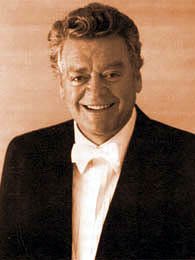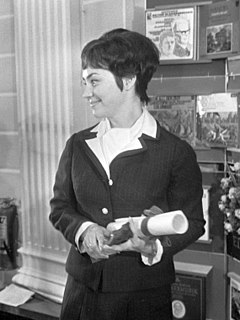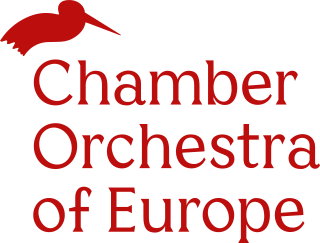Related Research Articles

Johann Carl Gottfried Loewe, usually called Carl Loewe, was a German composer, tenor singer and conductor. In his lifetime, his songs were well enough known for some to call him the "Schubert of North Germany", and Hugo Wolf came to admire his work. He is less known today, but his ballads and songs, which number over 400, are occasionally performed.
The Grammy Award for Best Classical Vocal Solo has been awarded since 1959. There have been several minor changes to the name of the award over this time:

Dietrich Fischer-Dieskau was a German lyric baritone and conductor of classical music, one of the most famous Lieder performers of the post-war period, best known as a singer of Franz Schubert's Lieder, particularly "Winterreise" of which his recordings with accompanists Gerald Moore and Jörg Demus are still critically acclaimed half a century after their release.
The Gramophone Classical Music Awards, launched in 1977, are one of the most significant honours bestowed on recordings in the classical record industry. They are often viewed as equivalent to or surpassing the American Grammy award, and referred to as the Oscars for classical music. They are widely regarded as the most influential and prestigious classical music awards in the world. According to Matthew Owen, national sales manager for Harmonia Mundi USA, "ultimately it is the classical award, especially worldwide."

Anne Sofie von Otter is a Swedish mezzo-soprano. Her repertoire encompasses lieder, operas, oratorios and also rock and pop songs.

Thomas Quasthoff is a German bass-baritone. Quasthoff has a range of musical interest from Bach cantatas, to lieder, and solo jazz improvisations. Born with severe birth defects caused by thalidomide, Quasthoff is 1.34 m, and has phocomelia.

Hermann Prey was a German lyric baritone, who was equally at home in the Lied, operatic and concert repertoires. His American debut was in November 1952, with the Philadelphia Orchestra and Eugene Ormandy, and his American recital debut took place in 1956, at New York's Carnegie Hall. As a Lieder singer, he was a gifted interpreter of Schubert, including his song-cycles Die schöne Müllerin and Die Winterreise and the collection of songs Schwanengesang, as well as of Robert Schumann, Richard Strauss and Gustav Mahler. He also appeared frequently as a soloist in Bach's Passions and Brahms' A German Requiem.

Cheryl Studer is an American dramatic soprano who has sung at many of the world's foremost opera houses. Studer has performed more than eighty roles ranging from the dramatic repertoire to roles more commonly associated with lyric sopranos and coloratura sopranos, and, in her late stage, mezzo-sopranos. She is particularly known for her interpretations of the works of Richard Strauss and Richard Wagner.

Edith Mathis is a Swiss soprano and a leading exponent of the works of Wolfgang Amadeus Mozart worldwide. She is known for parts in Mozart operas, but also took part in premieres of operas such as Henze's Der junge Lord.

The Chamber Orchestra of Europe (COE), established in 1981, is an orchestra based in London. The orchestra comprises about 60 members coming from across Europe. The players pursue parallel careers as international soloists, members of chamber groups and as tutors and teachers of music. The orchestra receives substantial support from the Gatsby Charitable Foundation and the Underwood Trust; they have no single home resident hall and no appointed resident conductor. The orchestra is a registered charity under English law.
Harald Feller is a German organist, choral conductor and composer teaching at the Hochschule für Musik und Theater München. He was awarded the 1983 Grand Prix du Disque Liszt.

Der Zwerg is a lied for voice and piano by Franz Schubert, written in the mid-1820s on a text by Matthäus von Collin. The poem is in terza rima. In Otto Erich Deutsch's catalogue of Schubert's works, it is Op. 22, No. 1, D. 771.

Christian Gerhaher is a German baritone and bass singer in opera and concert, particularly known as a Lieder singer.

Max van Egmond is a Dutch bass and baritone singer. He has focused on oratorio and Lied and is known for singing works of Johann Sebastian Bach. He was one of the pioneers of historically informed performance of Baroque and Renaissance music.
Hermann Reutter was a German composer and pianist who worked as an academic teacher, university administrator, recitalist, and accompanist. He composed several operas, orchestral works, and chamber music, and especially many lieder, setting poems by authors writing in German, Russian, Spanish, Icelandic, English, and ancient Egyptian and Greek, among others.
The orchestral song is a late romantic genre of classical music for solo voices and orchestra.

Ulf Bästlein is a German bass-baritone and doctor of philology . Bästlein attended lessons for singing at the University of Music and Performing Arts Graz.

"Erlkönig", Op. 1, D 328, is a Lied composed by Franz Schubert in 1815, which sets Johann Wolfgang von Goethe's poem of the same name. The singer takes the role of four characters — the narrator, a father, his small son, and the titular "Erlking", a supernatural creature who pursues the boy — each of whom exhibit different tessitura, harmonic and rhythmic characteristics. A technically challenging piece for both performers and accompanists, "Erlkönig" has been popular and acclaimed since its premiere in 1821, and has been described as one of the "commanding compositions of the century".
References
- ↑ Leonard, James. Prometheus ("Bedecke deinen Himmel"), song for voice & piano, D. 674 at AllMusic (Analysis)
- ↑ Wolf considered Schubert's "Ganymed" and "Prometheus" unsatisfactory, in part because "a truly Goethean spirit" could only be fulfilled in the "post-Wagnerian era", according to a Wolf letter to Emil Kaufmann, noted in Scott Messing, Schubert in the European Imagination: Fin-de-siècle Vienna, 2007, p. 192, note 57.
- ↑ Kravitt, Edward F., The Lied: Mirror of Late Romanticism, p. 65. Yale University Press, 1996, ISBN 978-0-300-06365-3
- ↑ Schubert arr. Reger: Orchestral Songs at AllMusic